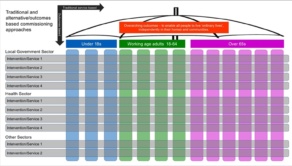Hewitt review: the case for ‘glaziers’
Hewitt review: the case for ‘glaziers’
We are pleased to see three key themes coming through loud and clear in the Hewitt Review.

Many of those working in health and social care believe securing better outcomes and experiences (that matter to care recipients), and better management of costs, can only be achieved by working together. This has been the thinking for some years and the NHS has established Vanguards, STPs and ICSs, all of which, in some way, are aimed at achieving these objectives.
But as we know, progress has been mixed. ICSs and other integrated care partnerships have made progress in some places, with some cohorts, and for some conditions or needs, but rarely do we see a holistic approach which, critically, is outcomes focused.
I’m a big fan of the International Consortium for Health Outcome Measurement (ICHOM) and its thinking about focusing on outcomes that matter to the recipients of care, rather than just providers. A useful way to think of this is to imagine a telescope, and to visualise looking at things from the recipient’s end, rather than just the providers’. As ICHOM say in their mission statement, “Doctors think about prostate cancer in terms of PSA levels. The average patient doesn’t.”
How then do we shift towards securing these outcomes?
Last week, NHSE published an exciting paper, ‘Next steps to building strong and effective integrated care systems across England‘. Its focus is on making ICS intentions, aims and vision a reality, something I absolutely applaud. The paper identifies several key areas that need to be addressed:
The paper makes the point that ‘vulnerable people need support that is joined up across councils, NHS, care and voluntary organisations; all based on a common understanding of the risks different people face’. My build here would be about the need to focus on outcomes that matter to these vulnerable people, and how those outcomes could be supported and secured by doing different things, not just the same things differently. As an example, in one overseas health and care system that sought to avoid hospitalisation for older people with co-morbidities, they found that 75% of the required interventions were non-health related.
Key requirements for ICSs set out in the paper include:
We see ICSs as being on a journey over three horizons:

It’s great to see a commitment to shifting the dial but this won’t happen with words alone – genuine joint and outcomes-based approaches are needed, alongside the supporting governance, systems, legislation and financial approaches. Above all, change cannot be successful without recognition of whole system complexity and the impact this has on the people who work in health and care. Without this recognition, everything else could be in place but horizon 3 would remain out of reach.
Our passion and experience at IMPOWER is very much focused on whole system approaches, outcomes that matter and enabling sustainable change – all of which are critical to getting to horizon 3. Do get in touch if you’d like to explore this further.